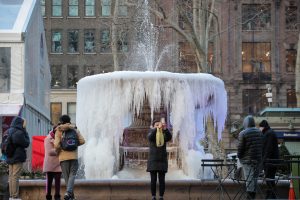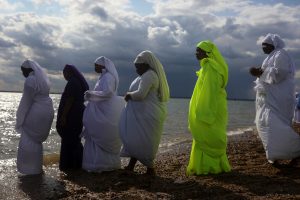
By David Shepardson
WASHINGTON (Reuters) – A federal appeals court was hearing arguments on Friday over whether the Trump administration acted legally when it repealed landmark net neutrality rules governing internet providers in December 2017.
The panel, which set aside 2-1/2 hours to hear the case, is made up of Judges Robert Wilkins and Patricia Millett, two appointees of Democratic former President Barack Obama, and Stephen Williams, an appointee of Republican Ronald Reagan.
It was the first hearing in court on the Federal Communication Commission’s controversial decision to repeal the 2015 Obama administration’s net neutrality rules.
The arguments focus on how internet providers should be classified under law – either as information service providers as the Trump administration decided or as a public utility, which subjects companies to more rigorous regulations – and whether the FCC adhered to procedural rules.
The Republican-led FCC voted 3-2 along party lines to reverse the net neutrality rules, which barred internet service providers from blocking or throttling traffic, or offering paid fast lanes, also known as paid prioritization. The FCC said providers must disclose any changes in users internet access as it repealed what it termed “unnecessary, heavy-handed regulations.”
Kevin Russell, a lawyer for the challengers, told the U.S. Court of Appeals for the District of Columbia that hypothetically an internet provider could now block the Daily Caller website or graphic animal abuse videos as long as they disclosed it.
“We never get a straight answer from the commission whether it thinks blocking and throttling must always be prohibited” or only if it applies to punishing a competitor, Russell said, arguing that the FCC failed to engage in a reasoned analysis and did not properly assess consumer complaints.
Judge Williams suggested users could simply choose another provider if some content was blocked.
The FCC repeal was a win for providers like Comcast Corp, AT&T Inc and Verizon Communications Inc, but was opposed by internet companies like Facebook Inc, Amazon.com Inc and Alphabet Inc.
A group of 22 state attorneys general and the District of Columbia asked the appeals court to reinstate the Obama-era internet rules and to block the FCC’s effort to pre-empt states from imposing their own rules guaranteeing an open internet.
Several internet companies are also part of the legal challenge, including Mozilla Corp, Vimeo Inc and Etsy Inc (ETSY.O), as well as numerous media and technology advocacy groups and major cities, including New York and San Francisco.
Major providers have not made any changes in how Americans access the internet since the repeal.
In October, California agreed not to enforce its own state net neutrality law until the appeals court’s decision on the 2017 repeal, and any potential review by the U.S. Supreme Court.
A decision is expected by this summer.
(Reporting by David Shepardson; Editing by Frances Kerry)












